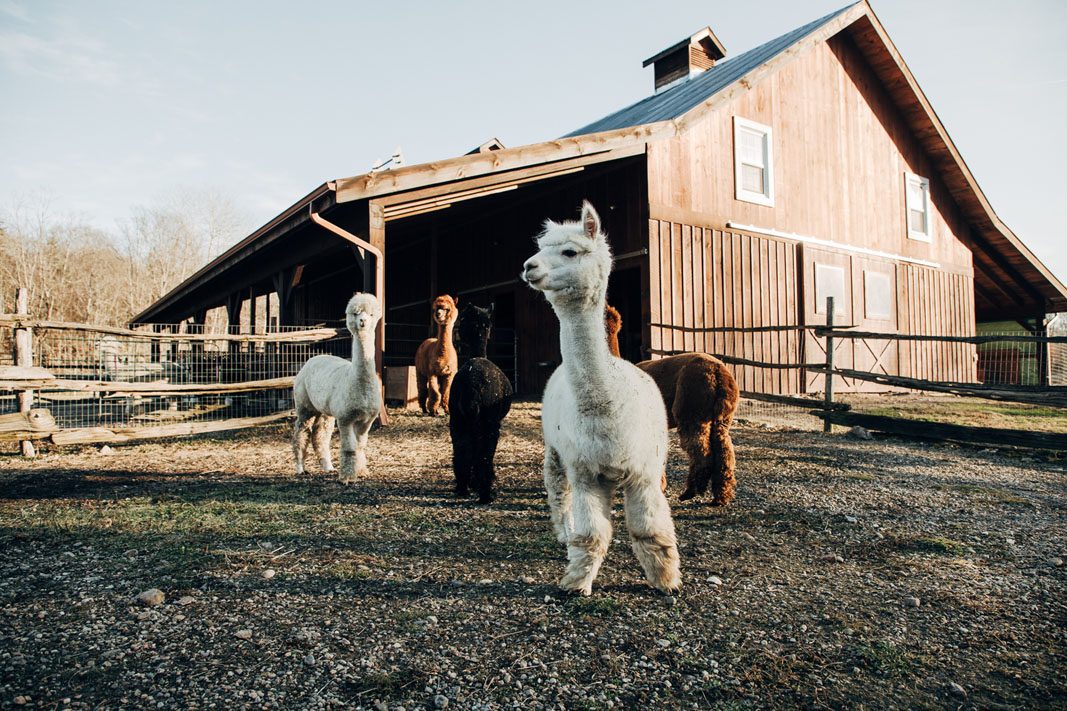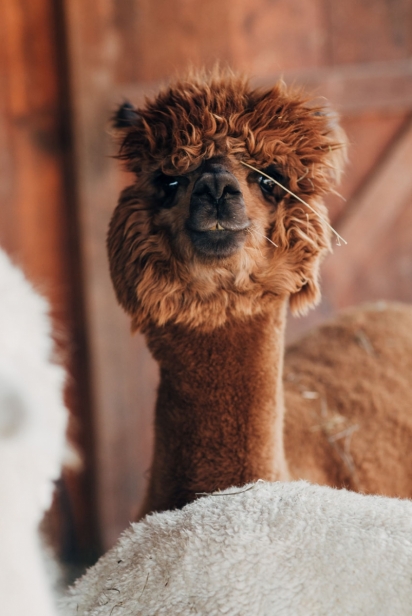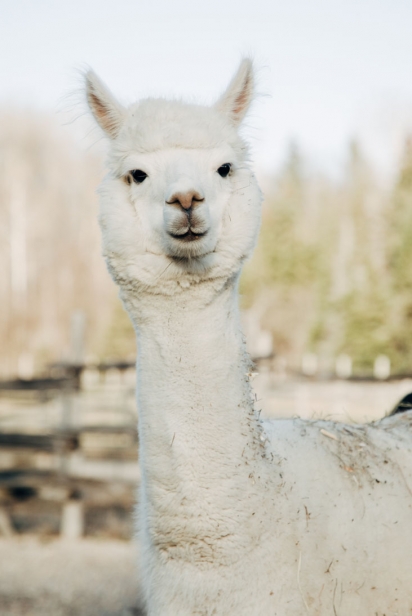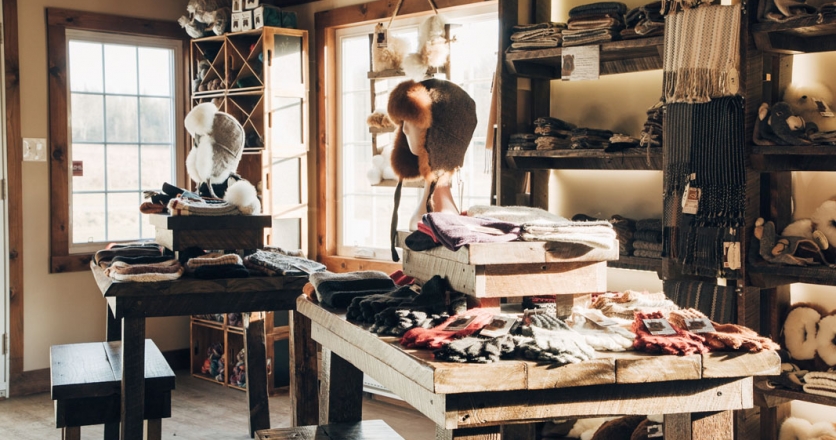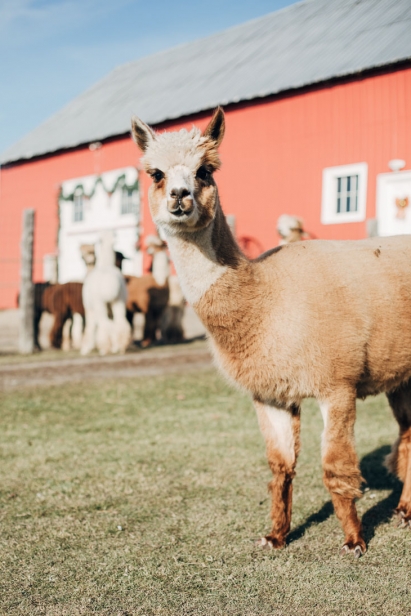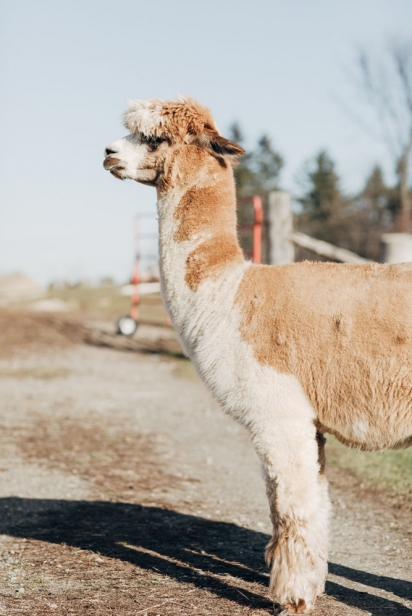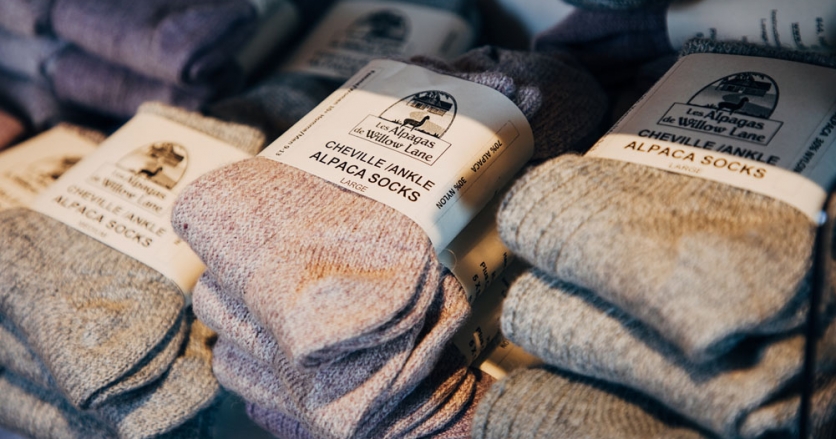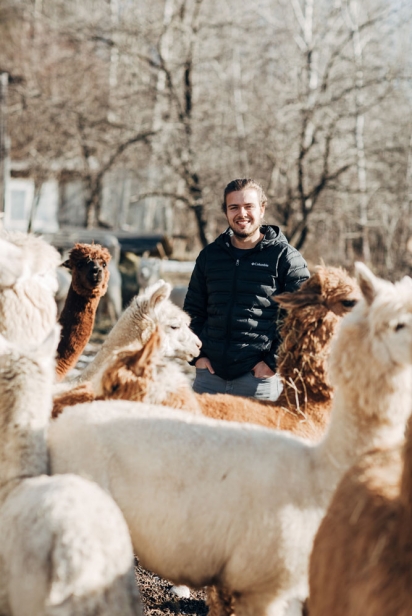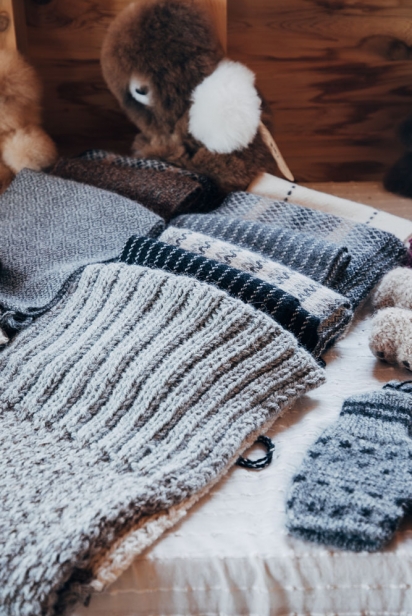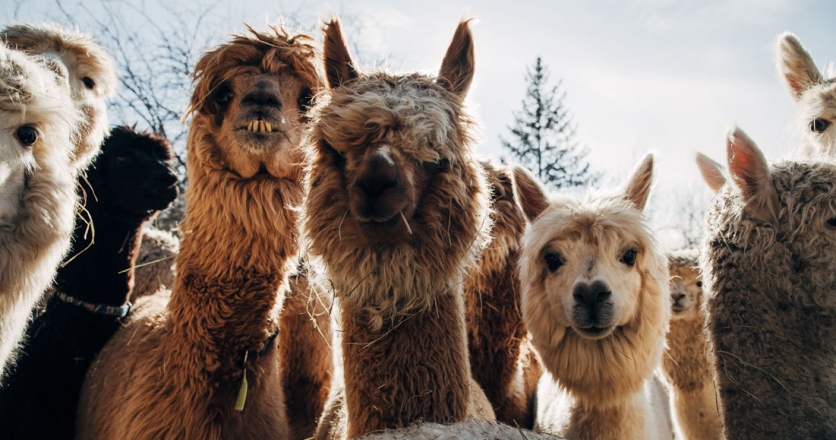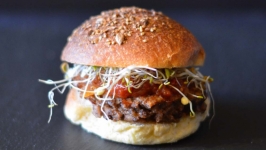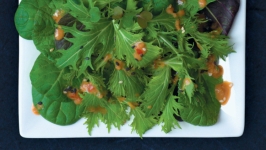Alpacas Will Warm Your Heart and Soul
So long cashmere, hello alpaca. While cashmere has traditionally been revered as the finest, softest and warmest of wool, alpaca is now having its moment in the spotlight. Comparable in warmth and softness, and warmer than merino wool, the fibre from these friendly and easy-to-love animals is more readily available because they thrive in the Canadian climate. There are several farms open for visits in the Ottawa area.
Chelsea Alpacas opened to the public four years ago. On 18 acres halfway between Chelsea and Wakefield, Geneviève Rousseau, her husband Marc Charron and their two daughters, keep 15 alpacas in a lovely post and beam barn and neat paddocks nestled against a wooded hillside.
“We decided to do it backwards,” Rousseau says with a laugh. “Neither of us has a background in agriculture, but I have been a knitter since I was very young. I knew nothing about alpacas. In my mind they looked like a big bird — an emu perhaps. We were watching a kid’s cartoon on television that was talking about their fibre and I fell deeply in love with these animals. I just fell in love with their faces.”
Rousseau, who works in women’s health in Ottawa, is not joking when she says they did things backwards. Not only did they know nothing about animal husbandry, but they didn’t even own a farm when they bought their first alpaca in 2012. They kept him and then several others on local farms. One alpaca led to another, they found land, built a house, then a barn and they now produce more than enough fibre to fulfil Rousseau’s knitting ambitions.
Their alpacas have won prizes across the country for the quality of their fibre and a wall of ribbons hangs in the cozy farm store as testament to this. Lining the shelves is a rainbow selection of skeins of fibre, the softest socks, shawls, sweaters, stylish hats, headbands and gloves. Some of the stock is imported from another Quebec maker and a fair-trade producer in Peru — where alpacas are native — but much is knitted by Rousseau herself.
She shows a pair of Newfoundland Thrummed mittens. There’s a heart-shaped pattern on their exterior, and inside, it is like sliding your hand into a cloud of softness. Each pair takes about 12 hours to knit. “I never sit without knitting, “ Rousseau says. “Now, with the store I feel a bit more under pressure; it has to be a passion.”
Garnered in a few short years, Rousseau is now an encyclopedia of knowledge about alpacas, which she happily shares with visitors. Wandering through the herd, she explains how age and weight affect the quality of the fibre, the shearing and sorting process. Each animal has a name. “They are our pets,” she says. “We love them like family.”
Alpagas Chelsea
1594 Route 105, Chelsea, Que.
alpagaschelsea.ca | 819.459.1626 | @alpagas.chelsea
Willow Lane Alpacas
To the west of Ottawa in the Pontiac is Willow Lane Alpacas. Gayle and Laird Graham raise 26 alpacas and a handful of Pygmy and Nigerian Dwarf goats on a 50-acre family farm that belonged to Laird’s parents. Over the years, they’ve raised pigs, cattle and chickens, but turned to alpacas in retirement. “They’re easy to manage, safe and enjoyable,” Laird says.
They’re also easy-keepers for many reasons: they only give birth in the daytime, so none of that checking on pregnant mothers throughout the night; they will not leave the herd so they don’t stray; they are friendly, but not overly familiar; they don’t smash up fences and their manure is pH neutral, so it can be used immediately to fertilize gardens. What’s not to love?
“The alpacas have been such a joy through COVID,” Gayle says. “We were able to continue doing farm tours because it’s outside and it was lovely to see kids being able to get out of the city. They brought such joy. Alpacas are great for nervous children as they don’t come to you, you go to them, so they give kids space.”
There are 22 different natural colours of alpaca and most of them seem to live at Willow Lane. Here, the animals hang around in mellow herds, males separated from females, lying on the sandy ground and quietly chewing hay. “Stress and too much protein make their fibre coarse,” Gayle explains, so it’s important to maintain a sense of calm on the farm.
Shearing in the spring is the busiest time of year. It takes three people and about 15 minutes to shear each animal. The alpaca is gently laid on its side on a table, keeping stress as low as possible.
“It’s really cute when they get up because they don’t recognize one another because they’ve had a haircut,” Gayle says, “so it’s the perfect time to move them.”
The best fleece, which defines the value of the animal, is found over the back of the creature. Hair from the hips and shoulders, and then neck and legs becomes progressively more coarse. Gayle can recognize a fleece when it’s laid out on the table. “I can tell you which animal it came from,” she says.
After shearing comes the labour-intensive sorting process. Gayle and anybody she can persuade to help her, pick through the fleeces, which unlike sheep’s wool have no smell and are not oily. She removes any impurities, such as dirt and tiny bits of hay and grass. This is essential, because the fibre must be sorted into different levels of quality before shipping to the mill for spinning and blending.
The fibre that Willow Lane Alpacas produces is made into socks of varying thickness, mittens and felted insoles, as well as luxurious duvets, sold online and at their on-farm store. “We sell eight or nine duvets a year,” Gayle says, “and I reckon we have settled many fights because they are good for hot sleepers and good for cold sleepers. They absorb moisture, are chemical-free and have no dust mites.”
Willow Lane Alpacas
44 Highway 148, Bristol, Que.
willowlane-alpaca.ca | @willowlane-alpaca.ca 819.647.5402
Les alpagas aux drôles de toupets
Hidden down a country road near Low, Qué., Les alpagas aux drôles de toupets is home to 60 alpacas, Adam Paquin, Jessica Bérubé and their two daughters.
Theirs is a story of following their dreams. First, they visited the farm as a family outing for an afternoon — and the farm was for sale. Just a few months later, they owned it. Neither has a background in farming; Paquin works for a food bank, and Bérubé at the Ottawa Hospital. But they’ve learned on the job and do all the work on the farm themselves. “It’s a little bit crazy,” Paquin says, “but with ambition and hard work, things happen.”
Paquin and Bérubé now offer farm tours to allow visitors to meet the herd. “We wanted to do something different,” Paquin says, “and alpacas are still rare in Quebec.” Paquin takes visitors on a guided tour of the property and offers visitors plenty of face time with the animals. The couple has small farm store where customers can pick up eggs, yarn and products made from alpaca fibre, as well as homemade treats such as soups and pickles.
“We love the fact that every alpaca is different, each has a [personality]. There’s just nothing cuter,” Paquin says.
Les alpagas aux drôles de troupes
684 Chemin Martindale, Low, Que.
facebook.com/alpagasauxdrolesdetoupets | 819-790-3618


